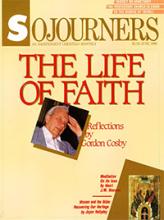I was a college basketball player. I was a guard, and I was quick. My claim to fame was a play in which I stole the ball from an opposing guard, tore down the court, and missed the lay-up. This happened at least half a dozen times each season.
In my first year of college, the women's varsity basketball team held our practices at 7 o'clock each morning. We were over at the gym before the sun came up during the winter months. Our use of the gym ranked in priority just below men's one-on-one basketball intramurals and intramural ping pong.
By my senior year we were alternating prime-time use of the gym with the men's varsity team. We shared the weight room and the athletic trainer (who cared for me through three seasons of shin splints) and ate steaks just like the men--well, not just like the men--before important games. We won third place in the Maine state basketball tournament that year. It had been a long struggle to effect the changes that made our victory possible; but it was a matter of justice.
I've always enjoyed playing basketball more than watching it. For years a Sojourners ritual passed me by--the annual NCAA basketball pool. All it requires is a dollar and some knowledge of the top-ranked college basketball teams. I had a dollar.
Ed Richardson had typed up elaborate forms for this year's pool, which listed in brackets all the match-ups and even included team records. All one had to do was predict and fill in the winning teams for each round. It seemed like the right time to break the male stranglehold on the competition; it was a matter of justice.
Read the Full Article

